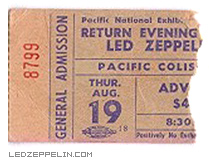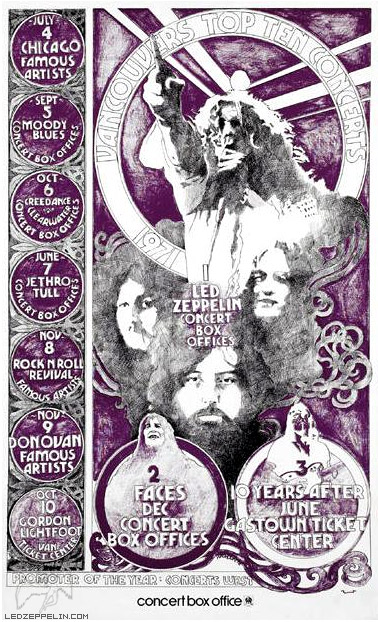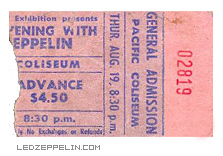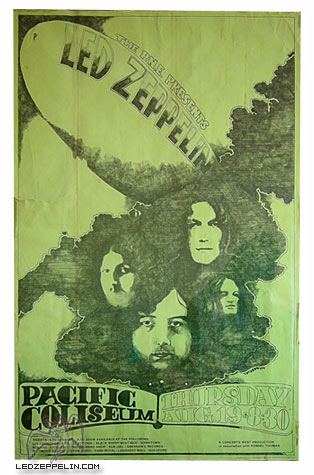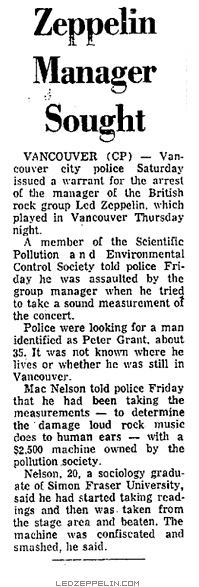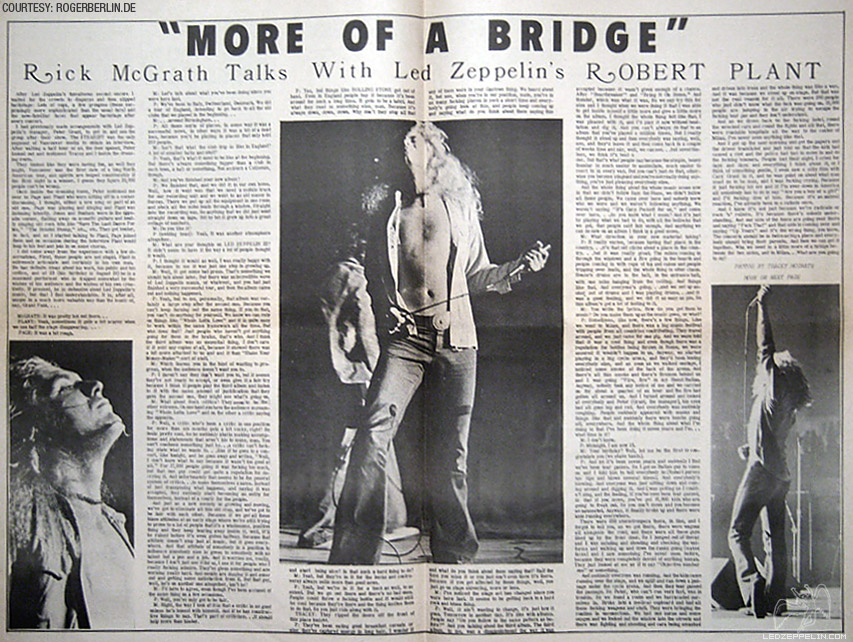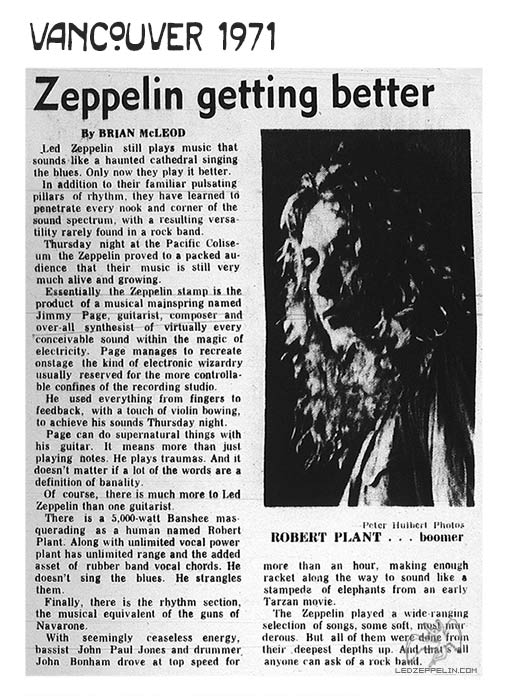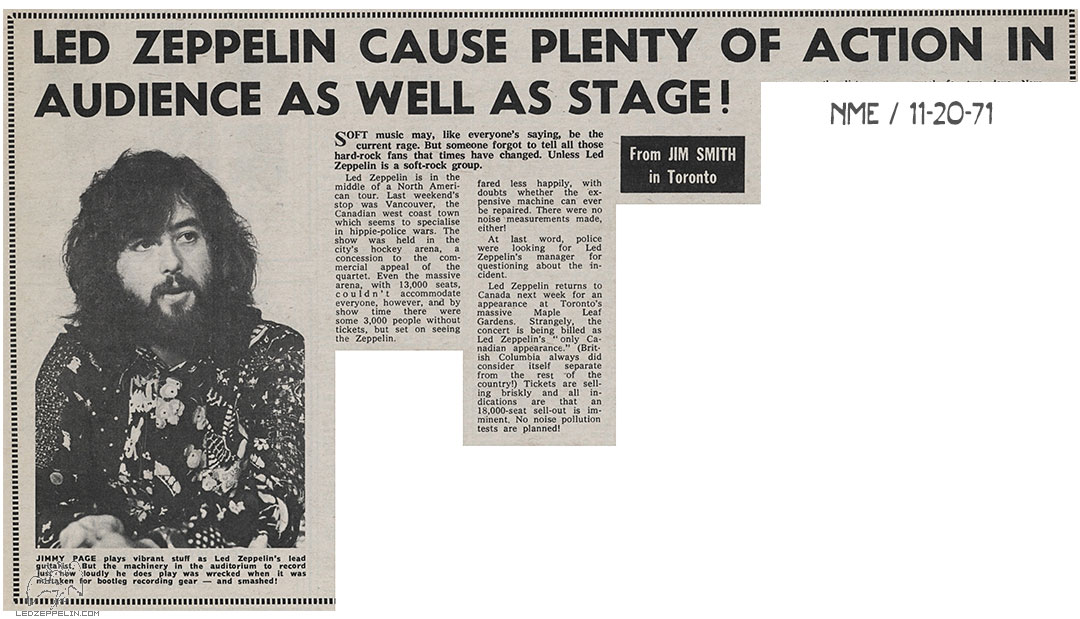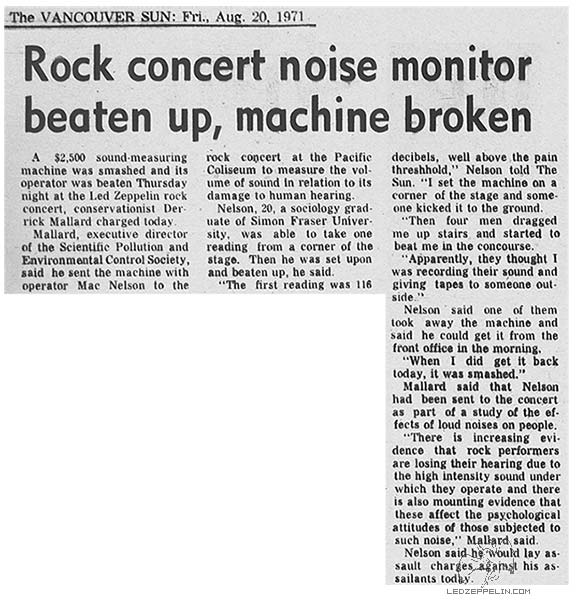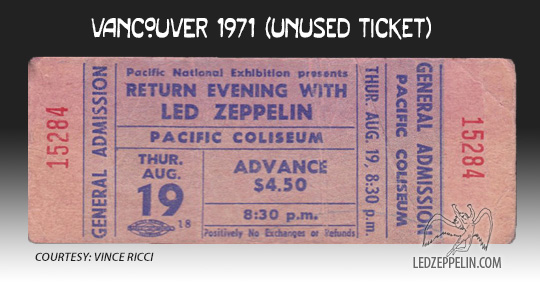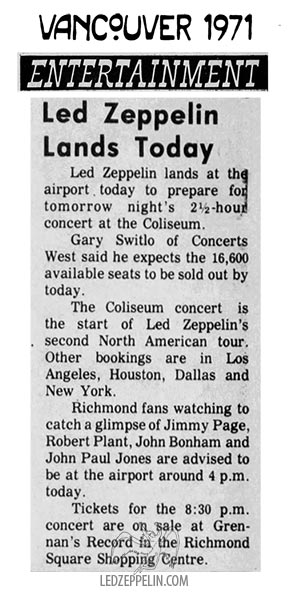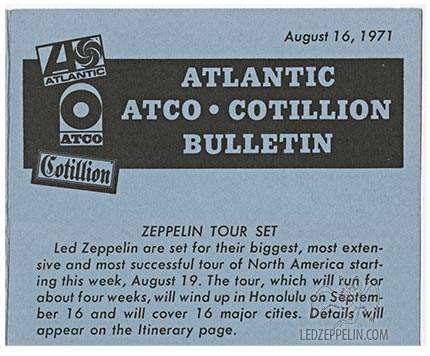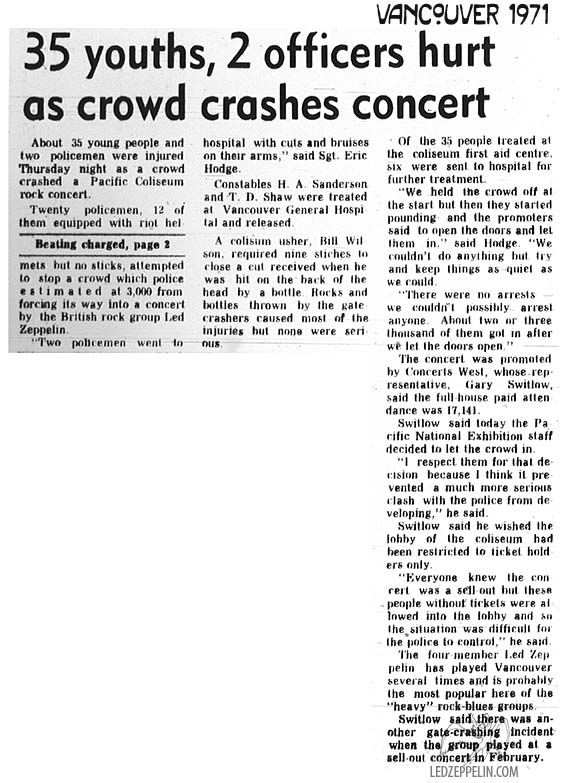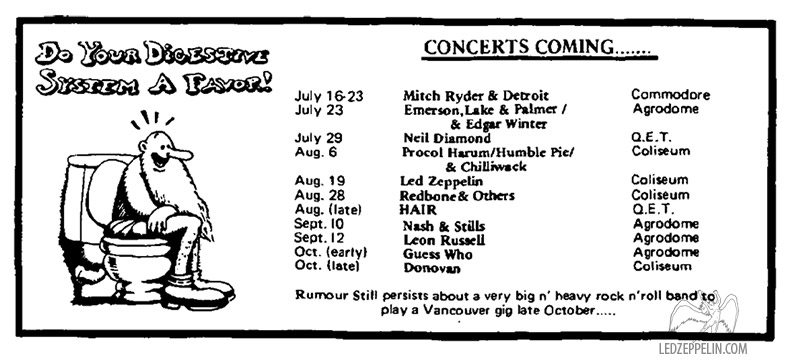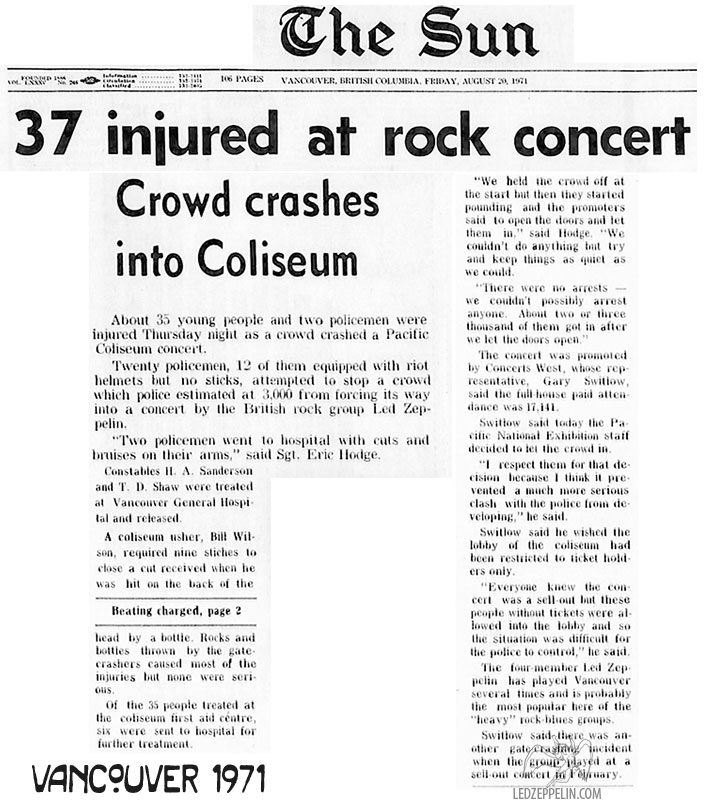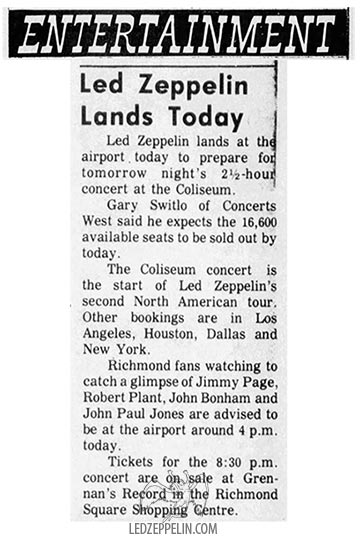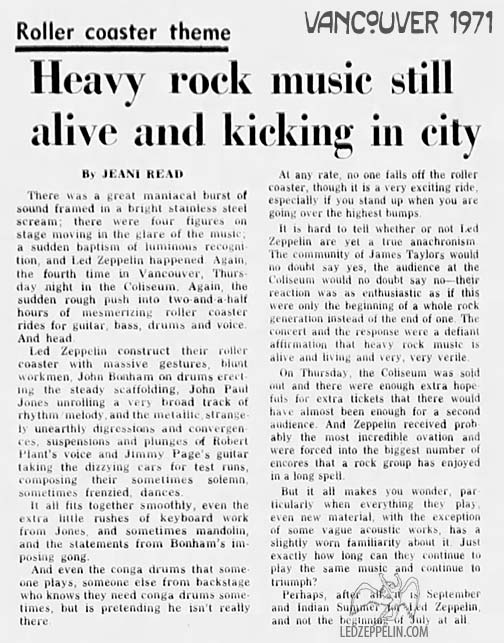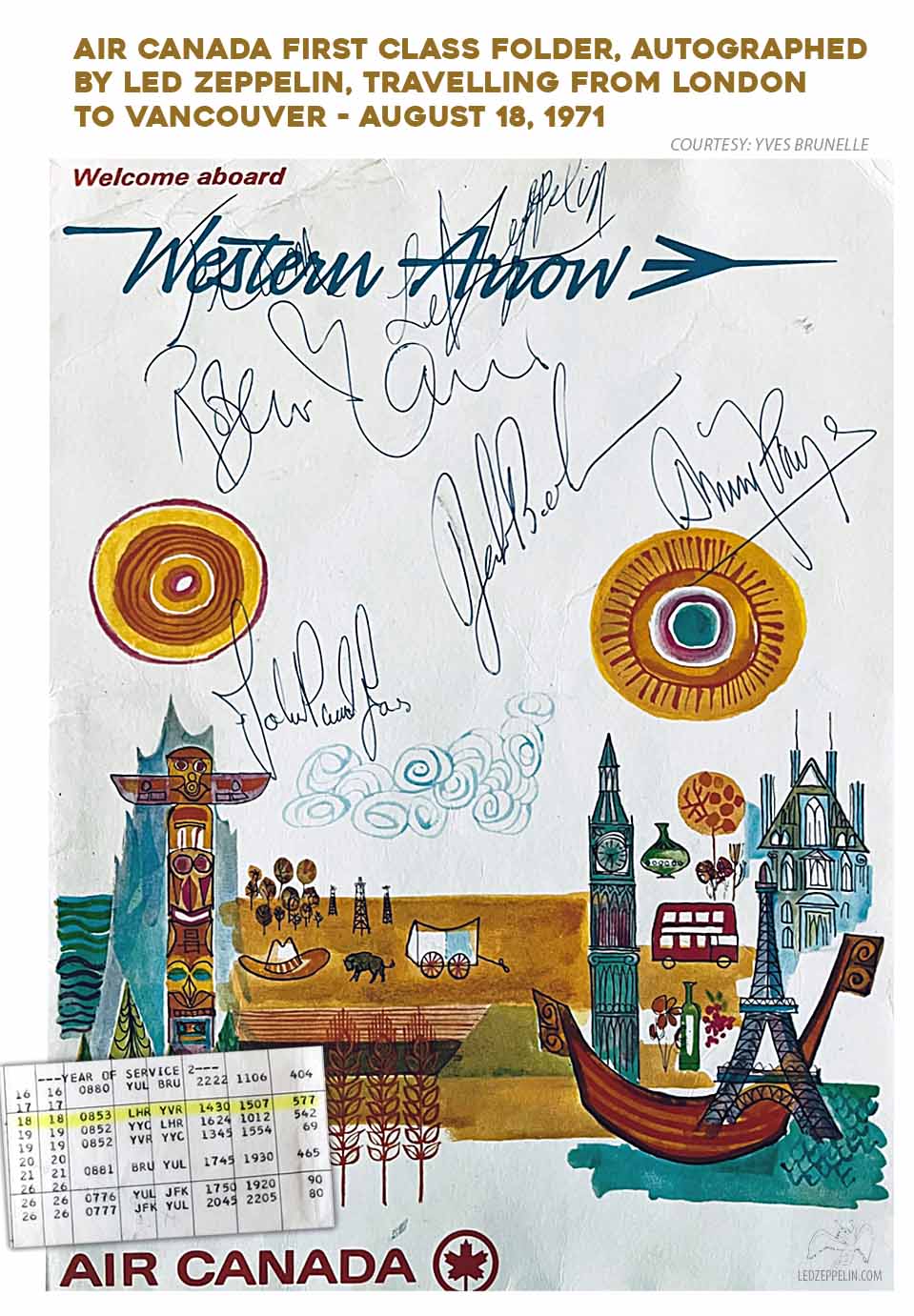Includes: Immigrant Song, Heartbreaker, Since I've Been Loving You, Black Dog, Dazed and Confused, Stairway to Heaven, Going to California, That's the Way, What Is and What Should Never Be, Celebration Day, Gallows Pole, Whole Lotta Love (medley: That's Alright, Mess Of Blues, Honey Bee, Sittin' and Thinkin'), Weekend, Rock and Roll, Communication Breakdown.
Canadian Journalist Rick McGrath interviewed Robert Plant backstage after the concert, which continued past midnight into Plant's 23rd birthday. Rick shares his story:
Ah, yes, Led Zep... the seminal sex heavy metal band of the early 70s... let's face it, Robert Plant was The Frontman for any rock ensemble, and Jimmy Page was by far the definitive guitar hero of his age. For me this was The Big Time, an exclusive interview with what was probably the world's hottest band.
I got to watch the concert from the stage -- about 10 feet away from Page. About 3,000 Zepheads from Seattle drove up for the show, only to find there were no tickets available. I remember them leaning on the glass outside the Pacific Coliseum until showtime, when the promoters decided it was safer to let them in rather than risking them crashing through the glass... so the Coliseum swelled to about 18,000 fans. Twice during the show they had to stop the concert and move the equipment back, because the crush of fans at the front was so thick they started to rip the stage apart. Zany.
It was one helluva show, culminating in Dazed & Confused and for me, the biggest interview of my Straight career!
After Led Zeppelin's tumultuous second encore I waited for the crowds to disperse and then slipped backstage: lots of cops, a few groupies (these surprisingly more sophisticated than the usual fare) and the now-familiar faces that appear backstage after every concert.
I had previously made arrangements with Led Zeppelin's manager, Peter Grant, to get in and see the group after their show. For some reason The Straight was the only Vancouver media to obtain an interview. After waiting a half hour or so, the door opened, Peter looked out and me motioned me inside the dressing room.
They looked like they were having fun, as well they might. Vancouver was the first date of a long North American tour, and spirits are helped considerably if the first night is a winner. I guess they figure 18,000 people can't be wrong.
Once inside the dressing room, Peter motioned me over to Page and Plant who were sitting off in a corner discussing, I thought, either a new song or part of an old one. Page was playing and singing and Plant was listening intently. Jones and Bonham were in the opposite corner, flailing away on acoustic guitars and loudly singing old rock hits like "Save The Last Dance For Me," "The Bristol Stomp," etc., etc. They got louder, in fact, and as I started talking to Plant, Page joined them and on occasion during the interview Plant would leap to his feet and join in on some chorus.
I did come away from the experience with a few observations. First, these people are not stupid. Plant is extremely articulate and certainly is his own man.
He has definite ideas about his work, his public and his critics, and at 23 (his birthday arrived during the interview) he is a seasoned performer who is trapped somewhat by the wishes of his audience and the limitations of his own creativity. If pressed, he is defensive about Led Zeppelin, but that I find understandable. It is, after all, the ultimate male fantasy....
Rick: It was pretty hot out there. . .
Robert Plant: Yeah, sometimes it gets a bit scary when we see half the stage disappearing...
Jimmy Page: It was a bit rough.
Rick: Let's talk about what you've been doing since you were here last.
Plant: We've been to Italy, Switzerland, Denmark. We did a tour of England, intending to go back to all the old clubs that we played in the beginning. .
Rick: ....around Birmingham...
Plant: All those sorts of places. In some way it was a successful move, in other ways it was a bit of a dead loss, because you'd be playing in places that only hold 250 people.
Rick: Isn't that what the club trip is like in England? A lot of smaller halls and stuff?
Plant: Yeah, that's what it used to be like at the beginning. But there's always something bigger than a club in each town, a hall or something. Not so much a Coliseum, though.
Rick: And you've finished your new album?
Plant: We finished that, and we did it in our own home. Well, how it went was that we used a mobile truck for our recording unit and we went to an old manor in Surrey. There we put up all the equipment in one room and stuck all the mike leads through a window. Straight into the recording van. So anything that we did just went straight down on tape. Bit by bit it grew up into a great collage of numbers.
Rick: Do you like it?
Plant: (nodding head): Yeah. It was another atmosphere altogether.
Rick: What are your thoughts on Led Zeppelin III? It didn't seem to have it the way a lot of people thought it would.
Plant: I thought it would as well. I was really happy with it, because to me it was just one step in growing up.
Rick: Well, it got some bad press. That's something we should talk about later. But there was an incredible wave of Led Zeppelin mania, or whatever, and you had just finished a very successful tour, and then the album came out and nothing happened.
Plant: Yeah, but to me, personally, that album was certainly a large step after the second one. Because you can't keep turning out the same thing. If you do that, you can't do anything for yourself. We know we can rely on things like Whole Lotta Love and it is quite easy to work within the same framework all the time. But who does that? Just people who haven't got anything going for them in the brains, that's who. And I think the third album was an essential thing, I don't care if it sold any copies at all, because it showed there was a bit more attached to us and it than Shake Your Money-Maker sort of stuff.
Rick: Which leaves you in the bind of wanting to progress, when the audience doesn't want you to.
Plant: I daren't say they don't want you to, but it seems they're not ready to accept, or even give it a fair try because I think if people play the third album and listen to it with the same amount of justification that they gave the second one, they might see what's going on.
Rick: What about rock critics? They seem to be the other extreme. On one hand you have the audience screaming Whole Lotta Love, and on the other a critic saying the opposite.
Plant: Well, a critic who's been a critic in one position for more than six months gets a bit cocky, right? He feels pretty cool. So he suddenly starts making assumptions and statements that aren't his to make, man. You can't condemn something just by.... a critic can't fucking state what he wants to... like if he goes to a concert, like tonight, and he goes away and writes, "Well, I don't know what to say because it wasn't too good at all." For 17,000 people going it was fucking too much, but that one guy could get quite a reputation for decrying it. And unfortunately that seems to be the general system of critics.... to make themselves a name. Instead of just transposing what happens, and saying it was accepted, they suddenly start becoming an entity for themselves, instead of a courier for the people.
And just as a new society is growing and moving, we've got to eliminate all this old crap, and we've got to be fair with each other. Because if we get all these blase attitudes at an early stage where we're still trying to prove to a lot of people that it's a wholesome, positive thing and they keep tearing away inside it, well, it'll be ruined before it's even gotten halfway. Because that attitude doesn't stop just at music, but it goes everywhere. And that attitude of somebody in a position to influence somebody else is open to somebody with no talent but a pen and a job. And it worries me, really, because I don't just see it for us, I see it for people who I really fucking admire. They've given something and are working really hard. And people are digging it and going out and getting some satisfaction from it. But that guy, well, he's on another one altogether, isn't he?
Rick: I'd have to agree, even though I've been accused of the same thing on a few occasions.
Plant: Well, you've only got to be fair.
Rick: Right, the way I look at it is that a critic is no good unless he's honest with himself. And if he has constructive things to say. That's part of criticism. It should help more than hinder.
Plant: Yes, but things like Rolling Stone get out of hand. Even in England people buy it because it's been around for such a long time. It gets to be a habit. And what they read is something else, man. Because it's always down, down, down. Why don't they stop all that and start being nice? Is that such a hard thing to do?
Rick: Yeah, but they're in it for the bucks and controversy always sells more than good news.
Plant: Yeah, but we're in it for a buck as well, to an extent. But we go out there and there's no bad ones. People could throw a fucking bottle and it would still be cool because they're there and the thing incites them to do that. So you just ride along with it.
Rick: They ripped the doors off the front of this place tonight.
the aftermath...
Plant: They've been eating good breakfast cereals or else they've captured energy in long hair. I wonder if any of them were in your Gastown thing. We heard about it, but see, when you're in our position, mate, you're in so many fucking places in such a short time and everybody's going look at this, and people keep coming up and saying what do you think about them saying this and what do you think about them saying that? Half the time you miss it or you just don't even know it's there. Because if you get affected by these things, well, you just go on stage shivering, more or less.
Rick: I've noticed the stage act has changed since you were here last. It seems to be getting back to a hard rock and blues thing.
Plant: Well, it ain't wanting to change, it's just how it goes. Tomorrow is another day. It's like with albums. People say "Do you follow in the same pattern as before?" And you talking about the third album. The third album, to me, was a disappointment in the way it was accepted because it wasn't given enough of a chance.
After Heartbreaker and Bring It On Home. And thunder, which was what it was. So we say try this for size and I thought when we were doing it that I was able to get inside myself a little more and give a little more on the album. I thought the whole thing felt like that. I was pleased with it, and I'd play it now without hesitation and dig it. And you can't always do that to an album that you've played a million times. But I really thought it stood up and then everybody was saying, well, noo, and they'd leave it and then come back in a couple of weeks time and say, well, we can see. . .but nevertheless, we think it's best. But that's what people say because the simple, heavy thunder is much easier to assimilate, much easier to react to in every way. But you can't just do that, otherwise you become stagnant and you're not really doing anything, you're just pleasing everybody else.
And the whole thing about the whole music scene now is that we didn't follow Sam the Sham, we didn't follow all those people. We came over here and nobody knew who we were and we weren't following anything. We weren't saying "It's Gary Puckett for us," and come over here. . .do you know what I mean? And it's just by playing what we had to do, with all the bollocks that we got, that people said fair enough. And anything we can do new on an album I think is a good move.
Rick: What direction is your new material taking?
Plant: It really varies, Because having that place in the country... it's that old cliche about a place in the country... but it was really great. The mikes coming in through the windows and a fire going in the hearth and people coming in with cups of tea and cakes and people tripping over leads, and the whole thing is utter chaos. Bonzo's drums are in the hall, in the entrance hall, with one mike hanging from the ceiling. And things like that. And everyone's going... and we set up anther set of drums and I was playing drums... and it was a good feeling, and we did it as easy as pie. So this album's got a lot of feeling to it.
Rick: You write the lyrics. How do you get them to music? Do you make them up as the music goes, or what?
Plant: Sometimes, like now, there's a few things. Like we went to Milan, and there was a big music festival with people from all countries contributing. They travel around, and we just came for one gig. And we were told that it was a cool thing and even though there was a reputation for bottles being thrown in Rome, we were assured it wouldn't happen to us. Anyway, we started playing in a big cycle arena, and they'd been booing everybody else, and as soon as we walked onstage, I noticed some smoke at the back of the arena. And there's all this smoke and there's firemen behind us and I was going "fire! fire!" in my finest Italian.
Anyway, nobody took any notice of me and we carried on for about a quarter of an hour and the fire had gotten all around us. And I turned around and looked at everybody and Peter (Grant, the manager), his eyes had all gone big and red. And everybody was suddenly coughing. People suddenly appeared with masks and things like that and suddenly there were bombs going off, everywhere. And the whole thing about what I'm doing is that I've been doing it seven years and I'm. . . what time is it?
Rick: Midnight.
Plant: I am now 23.
Rick: Your birthday? Well, let me be the first to congratulate you (we shake hands).
Plant: And so it's been seven years and suddenly I find we've been tear gassed. So I got an Italian guy to come on and I told him to tell everybody to (Robert purses his lips and blows several times). And everybody's blowing. And everyone was just sitting down and coming around and digging it. And I was getting so I couldn't sing, and the feeling, if you've ever been tear gassed, is that if you move, you've got 15,000 kids who are going to freak out. So you don't move and you become so nauseated. Anyway, it finally broke up and there were kids running everywhere.
There were 250 stormtroopers there, in line, and I forgot to tell you, as we got there, there were wagons all alongside the road, and there were all these guys lined up by the front door. So I jumped out of the car and I was saluting and shouting and checking the uniforms and walking up and down the ranks going (makes faces) and I saw something I've never seen before, because they were completely devoid of anything human. They just looked at me as if to say "Objective number one" or something.
And suddenly everyone was running. And the kids came running over the stage, and we split and ran down a passage under the cycle arena. And then they tear gassed the passage. So Peter, who can't run very fast, was in trouble. So we found a room and we barricaded ourselves in. Broke into a medical cupboard and had all these fucking weapons and stuff. They were bringing the roadies in unconscious. We had one nurse and some oxygen and we looked out the window into the streets and there was fighting and shooting and cars being smashed and driven into trees and the whole thing was like a war. And it was because we stood up on stage. But that was not the real reason for it all. There were 250 people who just didn't know what the fuck was going on. 15,000 people are jumping in the air trying to escape the fucking tear gas and they don't understand.
And as we drove back to the fucking hotel, round the wrecked cars and round the fights and all that, there were roadside hospitals all the way to the center of Milan. I've never seen anything like that.
And I got up the next morning and got the papers and the driver translated and just told us that the kids had caused a riot and the police had had to move in and do the fucking honours. People lost their sight. I cried for days and days and everything I think about it, or I think of something gentle, I even saw a silly film with Cary Grant in it, and he was going on about what man must do to be man, and I was fucking crying. Because it just fucking hit me and if I'm ever down in America all somebody has to do is say. "Are you a boy or a girl" and I'll fucking dive at him. Because it's an animal reaction. I've already been in a rathole once.
And I know it's not just because we're radicals or rock 'n' rollers. It's because there's nobody understanding. And our side of the fence are going over there and saying "Fuck That", and that side is coming over and saying "Up Yours", and it's the wrong thing, you know. The concerts should be in twice as big a place and everybody should bring their parents. And then we can get it together. What we need is more of a bridge between the two sides, and in Milan. What are you going to do? - - R. McGrath.
-- Footnote: The dangerously overcrowded arena resulted in some damage to the stage and injuries. Over 3,000 fans without tickets attempted to storm the gates causing 35 youths and two police officers to be injured. On the group's follow-up tour in 1972, Vancouver officials refused to grant a licence for their scheduled concert, after tickets were virtually sold out.
Canadian Journalist Rick McGrath interviewed Robert Plant backstage after the concert, which continued past midnight into Plant's 23rd birthday. Rick shares his story:
Ah, yes, Led Zep... the seminal sex heavy metal band of the early 70s... let's face it, Robert Plant was The Frontman for any rock ensemble, and Jimmy Page was by far the definitive guitar hero of his age. For me this was The Big Time, an exclusive interview with what was probably the world's hottest band.
I got to watch the concert from the stage -- about 10 feet away from Page. About 3,000 Zepheads from Seattle drove up for the show, only to find there were no tickets available. I remember them leaning on the glass outside the Pacific Coliseum until showtime, when the promoters decided it was safer to let them in rather than risking them crashing through the glass... so the Coliseum swelled to about 18,000 fans. Twice during the show they had to stop the concert and move the equipment back, because the crush of fans at the front was so thick they started to rip the stage apart. Zany.
It was one helluva show, culminating in Dazed & Confused and for me, the biggest interview of my Straight career!
After Led Zeppelin's tumultuous second encore I waited for the crowds to disperse and then slipped backstage: lots of cops, a few groupies (these surprisingly more sophisticated than the usual fare) and the now-familiar faces that appear backstage after every concert.
I had previously made arrangements with Led Zeppelin's manager, Peter Grant, to get in and see the group after their show. For some reason The Straight was the only Vancouver media to obtain an interview. After waiting a half hour or so, the door opened, Peter looked out and me motioned me inside the dressing room.
They looked like they were having fun, as well they might. Vancouver was the first date of a long North American tour, and spirits are helped considerably if the first night is a winner. I guess they figure 18,000 people can't be wrong.
Once inside the dressing room, Peter motioned me over to Page and Plant who were sitting off in a corner discussing, I thought, either a new song or part of an old one. Page was playing and singing and Plant was listening intently. Jones and Bonham were in the opposite corner, flailing away on acoustic guitars and loudly singing old rock hits like "Save The Last Dance For Me," "The Bristol Stomp," etc., etc. They got louder, in fact, and as I started talking to Plant, Page joined them and on occasion during the interview Plant would leap to his feet and join in on some chorus.
I did come away from the experience with a few observations. First, these people are not stupid. Plant is extremely articulate and certainly is his own man.
He has definite ideas about his work, his public and his critics, and at 23 (his birthday arrived during the interview) he is a seasoned performer who is trapped somewhat by the wishes of his audience and the limitations of his own creativity. If pressed, he is defensive about Led Zeppelin, but that I find understandable. It is, after all, the ultimate male fantasy....
Rick: It was pretty hot out there. . .
Robert Plant: Yeah, sometimes it gets a bit scary when we see half the stage disappearing...
Jimmy Page: It was a bit rough.
Rick: Let's talk about what you've been doing since you were here last.
Plant: We've been to Italy, Switzerland, Denmark. We did a tour of England, intending to go back to all the old clubs that we played in the beginning. .
Rick: ....around Birmingham...
Plant: All those sorts of places. In some way it was a successful move, in other ways it was a bit of a dead loss, because you'd be playing in places that only hold 250 people.
Rick: Isn't that what the club trip is like in England? A lot of smaller halls and stuff?
Plant: Yeah, that's what it used to be like at the beginning. But there's always something bigger than a club in each town, a hall or something. Not so much a Coliseum, though.
Rick: And you've finished your new album?
Plant: We finished that, and we did it in our own home. Well, how it went was that we used a mobile truck for our recording unit and we went to an old manor in Surrey. There we put up all the equipment in one room and stuck all the mike leads through a window. Straight into the recording van. So anything that we did just went straight down on tape. Bit by bit it grew up into a great collage of numbers.
Rick: Do you like it?
Plant: (nodding head): Yeah. It was another atmosphere altogether.
Rick: What are your thoughts on Led Zeppelin III? It didn't seem to have it the way a lot of people thought it would.
Plant: I thought it would as well. I was really happy with it, because to me it was just one step in growing up.
Rick: Well, it got some bad press. That's something we should talk about later. But there was an incredible wave of Led Zeppelin mania, or whatever, and you had just finished a very successful tour, and then the album came out and nothing happened.
Plant: Yeah, but to me, personally, that album was certainly a large step after the second one. Because you can't keep turning out the same thing. If you do that, you can't do anything for yourself. We know we can rely on things like Whole Lotta Love and it is quite easy to work within the same framework all the time. But who does that? Just people who haven't got anything going for them in the brains, that's who. And I think the third album was an essential thing, I don't care if it sold any copies at all, because it showed there was a bit more attached to us and it than Shake Your Money-Maker sort of stuff.
Rick: Which leaves you in the bind of wanting to progress, when the audience doesn't want you to.
Plant: I daren't say they don't want you to, but it seems they're not ready to accept, or even give it a fair try because I think if people play the third album and listen to it with the same amount of justification that they gave the second one, they might see what's going on.
Rick: What about rock critics? They seem to be the other extreme. On one hand you have the audience screaming Whole Lotta Love, and on the other a critic saying the opposite.
Plant: Well, a critic who's been a critic in one position for more than six months gets a bit cocky, right? He feels pretty cool. So he suddenly starts making assumptions and statements that aren't his to make, man. You can't condemn something just by.... a critic can't fucking state what he wants to... like if he goes to a concert, like tonight, and he goes away and writes, "Well, I don't know what to say because it wasn't too good at all." For 17,000 people going it was fucking too much, but that one guy could get quite a reputation for decrying it. And unfortunately that seems to be the general system of critics.... to make themselves a name. Instead of just transposing what happens, and saying it was accepted, they suddenly start becoming an entity for themselves, instead of a courier for the people.
And just as a new society is growing and moving, we've got to eliminate all this old crap, and we've got to be fair with each other. Because if we get all these blase attitudes at an early stage where we're still trying to prove to a lot of people that it's a wholesome, positive thing and they keep tearing away inside it, well, it'll be ruined before it's even gotten halfway. Because that attitude doesn't stop just at music, but it goes everywhere. And that attitude of somebody in a position to influence somebody else is open to somebody with no talent but a pen and a job. And it worries me, really, because I don't just see it for us, I see it for people who I really fucking admire. They've given something and are working really hard. And people are digging it and going out and getting some satisfaction from it. But that guy, well, he's on another one altogether, isn't he?
Rick: I'd have to agree, even though I've been accused of the same thing on a few occasions.
Plant: Well, you've only got to be fair.
Rick: Right, the way I look at it is that a critic is no good unless he's honest with himself. And if he has constructive things to say. That's part of criticism. It should help more than hinder.
Plant: Yes, but things like Rolling Stone get out of hand. Even in England people buy it because it's been around for such a long time. It gets to be a habit. And what they read is something else, man. Because it's always down, down, down. Why don't they stop all that and start being nice? Is that such a hard thing to do?
Rick: Yeah, but they're in it for the bucks and controversy always sells more than good news.
Plant: Yeah, but we're in it for a buck as well, to an extent. But we go out there and there's no bad ones. People could throw a fucking bottle and it would still be cool because they're there and the thing incites them to do that. So you just ride along with it.
Rick: They ripped the doors off the front of this place tonight.
the aftermath...
Plant: They've been eating good breakfast cereals or else they've captured energy in long hair. I wonder if any of them were in your Gastown thing. We heard about it, but see, when you're in our position, mate, you're in so many fucking places in such a short time and everybody's going look at this, and people keep coming up and saying what do you think about them saying this and what do you think about them saying that? Half the time you miss it or you just don't even know it's there. Because if you get affected by these things, well, you just go on stage shivering, more or less.
Rick: I've noticed the stage act has changed since you were here last. It seems to be getting back to a hard rock and blues thing.
Plant: Well, it ain't wanting to change, it's just how it goes. Tomorrow is another day. It's like with albums. People say "Do you follow in the same pattern as before?" And you talking about the third album. The third album, to me, was a disappointment in the way it was accepted because it wasn't given enough of a chance.
After Heartbreaker and Bring It On Home. And thunder, which was what it was. So we say try this for size and I thought when we were doing it that I was able to get inside myself a little more and give a little more on the album. I thought the whole thing felt like that. I was pleased with it, and I'd play it now without hesitation and dig it. And you can't always do that to an album that you've played a million times. But I really thought it stood up and then everybody was saying, well, noo, and they'd leave it and then come back in a couple of weeks time and say, well, we can see. . .but nevertheless, we think it's best. But that's what people say because the simple, heavy thunder is much easier to assimilate, much easier to react to in every way. But you can't just do that, otherwise you become stagnant and you're not really doing anything, you're just pleasing everybody else.
And the whole thing about the whole music scene now is that we didn't follow Sam the Sham, we didn't follow all those people. We came over here and nobody knew who we were and we weren't following anything. We weren't saying "It's Gary Puckett for us," and come over here. . .do you know what I mean? And it's just by playing what we had to do, with all the bollocks that we got, that people said fair enough. And anything we can do new on an album I think is a good move.
Rick: What direction is your new material taking?
Plant: It really varies, Because having that place in the country... it's that old cliche about a place in the country... but it was really great. The mikes coming in through the windows and a fire going in the hearth and people coming in with cups of tea and cakes and people tripping over leads, and the whole thing is utter chaos. Bonzo's drums are in the hall, in the entrance hall, with one mike hanging from the ceiling. And things like that. And everyone's going... and we set up anther set of drums and I was playing drums... and it was a good feeling, and we did it as easy as pie. So this album's got a lot of feeling to it.
Rick: You write the lyrics. How do you get them to music? Do you make them up as the music goes, or what?
Plant: Sometimes, like now, there's a few things. Like we went to Milan, and there was a big music festival with people from all countries contributing. They travel around, and we just came for one gig. And we were told that it was a cool thing and even though there was a reputation for bottles being thrown in Rome, we were assured it wouldn't happen to us. Anyway, we started playing in a big cycle arena, and they'd been booing everybody else, and as soon as we walked onstage, I noticed some smoke at the back of the arena. And there's all this smoke and there's firemen behind us and I was going "fire! fire!" in my finest Italian.
Anyway, nobody took any notice of me and we carried on for about a quarter of an hour and the fire had gotten all around us. And I turned around and looked at everybody and Peter (Grant, the manager), his eyes had all gone big and red. And everybody was suddenly coughing. People suddenly appeared with masks and things like that and suddenly there were bombs going off, everywhere. And the whole thing about what I'm doing is that I've been doing it seven years and I'm. . . what time is it?
Rick: Midnight.
Plant: I am now 23.
Rick: Your birthday? Well, let me be the first to congratulate you (we shake hands).
Plant: And so it's been seven years and suddenly I find we've been tear gassed. So I got an Italian guy to come on and I told him to tell everybody to (Robert purses his lips and blows several times). And everybody's blowing. And everyone was just sitting down and coming around and digging it. And I was getting so I couldn't sing, and the feeling, if you've ever been tear gassed, is that if you move, you've got 15,000 kids who are going to freak out. So you don't move and you become so nauseated. Anyway, it finally broke up and there were kids running everywhere.
There were 250 stormtroopers there, in line, and I forgot to tell you, as we got there, there were wagons all alongside the road, and there were all these guys lined up by the front door. So I jumped out of the car and I was saluting and shouting and checking the uniforms and walking up and down the ranks going (makes faces) and I saw something I've never seen before, because they were completely devoid of anything human. They just looked at me as if to say "Objective number one" or something.
And suddenly everyone was running. And the kids came running over the stage, and we split and ran down a passage under the cycle arena. And then they tear gassed the passage. So Peter, who can't run very fast, was in trouble. So we found a room and we barricaded ourselves in. Broke into a medical cupboard and had all these fucking weapons and stuff. They were bringing the roadies in unconscious. We had one nurse and some oxygen and we looked out the window into the streets and there was fighting and shooting and cars being smashed and driven into trees and the whole thing was like a war. And it was because we stood up on stage. But that was not the real reason for it all. There were 250 people who just didn't know what the fuck was going on. 15,000 people are jumping in the air trying to escape the fucking tear gas and they don't understand.
And as we drove back to the fucking hotel, round the wrecked cars and round the fights and all that, there were roadside hospitals all the way to the center of Milan. I've never seen anything like that.
And I got up the next morning and got the papers and the driver translated and just told us that the kids had caused a riot and the police had had to move in and do the fucking honours. People lost their sight. I cried for days and days and everything I think about it, or I think of something gentle, I even saw a silly film with Cary Grant in it, and he was going on about what man must do to be man, and I was fucking crying. Because it just fucking hit me and if I'm ever down in America all somebody has to do is say. "Are you a boy or a girl" and I'll fucking dive at him. Because it's an animal reaction. I've already been in a rathole once.
And I know it's not just because we're radicals or rock 'n' rollers. It's because there's nobody understanding. And our side of the fence are going over there and saying "Fuck That", and that side is coming over and saying "Up Yours", and it's the wrong thing, you know. The concerts should be in twice as big a place and everybody should bring their parents. And then we can get it together. What we need is more of a bridge between the two sides, and in Milan. What are you going to do? - - R. McGrath.
-- Footnote: The dangerously overcrowded arena resulted in some damage to the stage and injuries. Over 3,000 fans without tickets attempted to storm the gates causing 35 youths and two police officers to be injured. On the group's follow-up tour in 1972, Vancouver officials refused to grant a licence for their scheduled concert, after tickets were virtually sold out.
setlists during this tour include: Immigrant Song, Heartbreaker, Since I've Been Loving You, Black Dog, Dazed and Confused, Stairway to Heaven, Going to California, That's the Way, Celebration Day, What Is and What Should Never Be, Moby Dick, Whole Lotta Love (medley), Communication Breakdown, Thank You.
